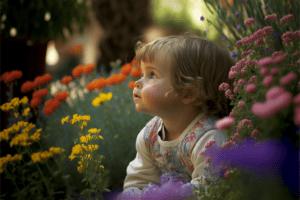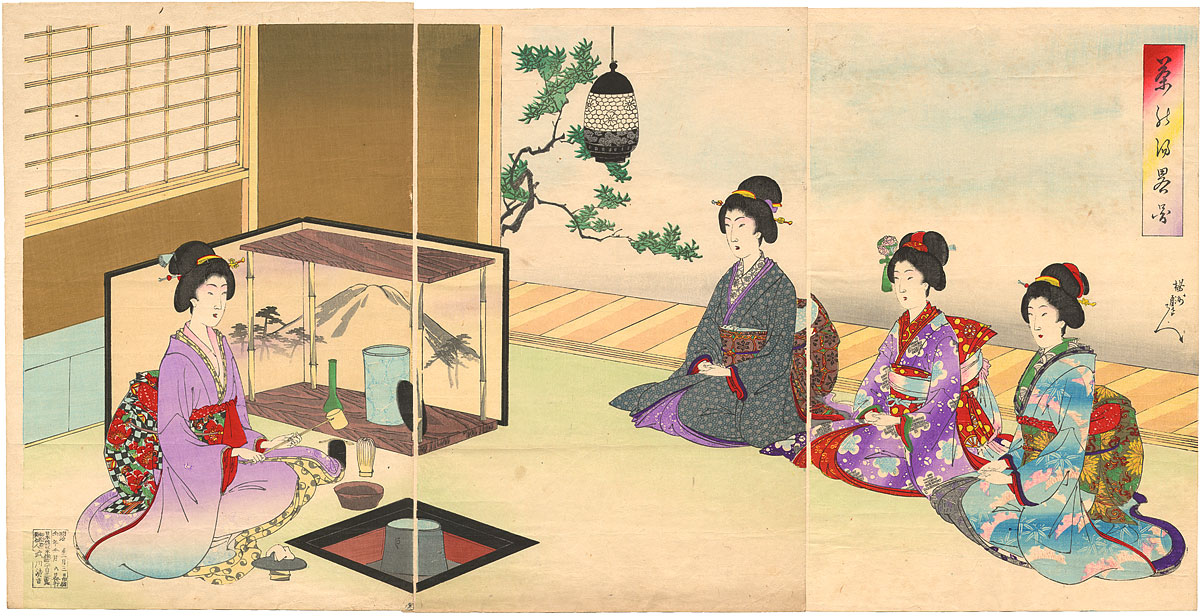The 7 pillars of mindfulness #3 beginner’s mind
The 7 pillars of mindfulness – # 3 Beginner’s mind
“One cannot fill a cup that is not empty.”
Beginner’s mind- curious attention
 The beginner’s mind means a special kind of relinquishing prejudice, comparable to the curiosity of a child, who experiences things for the first time and, takes note of them in amazement. Therefore it does not just mean to refrain from judging, whether a perceived object is either good or bad, known or unknown, but also a kind of inner enthusiasm that mixes with fascination – an incredibly joyful feeling. Curious attention is the principle of this inner attitude. With it, every moment is considered what it really is: new and unique. We give it our full, open and curious attention. In every moment, that we encounter this way, we can learn from it, and we can enjoy it. With open curiosity we perceive everything, this short moment can offer. Since childhood we have gradually lost this beginner’s spirit. As a child we were still enthusiastic about the first snow of the year, now we anticipate icy roads on our way to work, and slush later in the day: the beginner’s mind is lost, and we know “snow”, and what will happen when it is snowing.
The beginner’s mind means a special kind of relinquishing prejudice, comparable to the curiosity of a child, who experiences things for the first time and, takes note of them in amazement. Therefore it does not just mean to refrain from judging, whether a perceived object is either good or bad, known or unknown, but also a kind of inner enthusiasm that mixes with fascination – an incredibly joyful feeling. Curious attention is the principle of this inner attitude. With it, every moment is considered what it really is: new and unique. We give it our full, open and curious attention. In every moment, that we encounter this way, we can learn from it, and we can enjoy it. With open curiosity we perceive everything, this short moment can offer. Since childhood we have gradually lost this beginner’s spirit. As a child we were still enthusiastic about the first snow of the year, now we anticipate icy roads on our way to work, and slush later in the day: the beginner’s mind is lost, and we know “snow”, and what will happen when it is snowing.
Beginner’s mind – not-knowing
The beginner’s mind does not in any way include a devaluation. On the contrary, it takes a lot of practice and mindfulness to strip away all previous experience and ideas, of what will happen, for even one moment. Although we know quite well, that we cannot experience anything fully, but in the present, as in this very moment. Anything else would be, either reminiscence or imagination. That is why “not-knowing” is another term coinded for the beginner’ mind. Knowledge in our western culture is considered professional. The new information age is based upon knowledge, that has multiplied with particularly dramatic speed during the past 100 years. Old knowledge is constantly overlaid with the latest insights, expanded and made digitally available. The half-life of, for example, medical knowledge was 11  years in the 80s, today it measures just 5 years. “Kingfisher”, “blackberry”, “wren”, “fern” – belong to the about 50 words, describing elements of our natural environment, that were replaced in the 2015 edition of the 10,000-entry Oxford children’s dictionary with words such as “broadband” and “copy-paste”. Words such as these, are our gateway to the experience of living nature. When they disappear unnoticedly from language, fairy tales and stories, from reality, they also disappear from the web of meanings that we cast upon our reality, in order to understand it. We cannot fully appreciate, what we cannot name. Golden dandelions shine on the soccer field, ferns capriciously unroll their manifoldly pinnate leaves, the chestnut broken from its prickly shell shines seductively. In order to integrate such perceptions into our understanding of the world, and to be able to express them and share them with others for that matter, we need these lost words as well as children do. Contrary to what is claimed, the new information age is an age of storage and management of data outside of our memory, not an age of learning. (The only thing we are supposed to learn is, how to use information storage media.) That is one reason, why we sometimes feel so little in control of our present. On the other hand side, learning needs, next to comparison with existing knowledge, the unbiased, curious experience. It takes openness and the courage to admit, that we cannot know everything. It is about dealing openly and consciously with ignorance.
years in the 80s, today it measures just 5 years. “Kingfisher”, “blackberry”, “wren”, “fern” – belong to the about 50 words, describing elements of our natural environment, that were replaced in the 2015 edition of the 10,000-entry Oxford children’s dictionary with words such as “broadband” and “copy-paste”. Words such as these, are our gateway to the experience of living nature. When they disappear unnoticedly from language, fairy tales and stories, from reality, they also disappear from the web of meanings that we cast upon our reality, in order to understand it. We cannot fully appreciate, what we cannot name. Golden dandelions shine on the soccer field, ferns capriciously unroll their manifoldly pinnate leaves, the chestnut broken from its prickly shell shines seductively. In order to integrate such perceptions into our understanding of the world, and to be able to express them and share them with others for that matter, we need these lost words as well as children do. Contrary to what is claimed, the new information age is an age of storage and management of data outside of our memory, not an age of learning. (The only thing we are supposed to learn is, how to use information storage media.) That is one reason, why we sometimes feel so little in control of our present. On the other hand side, learning needs, next to comparison with existing knowledge, the unbiased, curious experience. It takes openness and the courage to admit, that we cannot know everything. It is about dealing openly and consciously with ignorance.
In psychotherapy in particular, it is important to develop a new perspective upon remembered experiences, and to be able to throw overboard the self-fulfilling prophecy: “It won’t work!” The willingness to persist in the beginner’s mind, to be open to new things, is the prerequisite for successfully experiencing alternative ways of relationship and interpersonal interaction within the protected space of a therapy.
But even outside of a therapeutic context, a healthy dose of curiosity, mindfulness and modesty are useful, while approaching others. They enable us to ask questions, that really matter to us. Together with the person we are talking to, we can explore and develop, what has not been there before, and which would neither have have come into existence, without talking to each other. We can notice similarities, that have previously been overlooked, if we acknowledge the other without prejudice.
Beginner’s mind – depth
If we lose the beginner’s mind, we replace conscious perception with knowledge and predictions derived from it. This is by no means wrong, especially in situations, where routines improve our reactions. Do you remember your first driving lessons? If you are not a “Schumi” gene carrier, you probably have experienced intensely, what it means to have a beginner’s mind then. However, you probably did not drive particularly well. On the other hand, boredom quickly arises when we think, we know it all. Then we are open to distractions or digress into thoughts, instead of deepening the perception of the moment.
In the beginner’s mind there is no thought, ‘I have attained something.’ All self-centered thoughts limit our vast mind. When we have no thought of achievement, no thought of self, we are true beginners. We can really learn something.“ – Shunryu Suzuki
 Esoteric or spiritual texts on the subject of mindfulness tirelessly emphasize the “magic”, and the “miracles”, that are opened up by the beginner’s mind, and invariably use the example of young children during Christmas. The beginner’s mind indeed helps us realise that these miracles exist. But life is neither an uninterrupted Christmas, nor does it consist of the incessantly astonished admiration for dandelions. Rather, the beginner’s spirit also includes a voluntary disciplined readiness, not to ignore unpleasant experiences. If we stay alert and curious even in stressful situations, we have a chance to observe the situation and ourselves, before we react. The resulting ability to differentiate allows different decisions. As we perceive the world through our senses, experiences serve as survival strategies. (As already explained above, experience helps us to judge situations: friend or foe, good or bad. But if we have had many experiences of a kind, for example, they can prevent us from getting a clear picture of a new, unknown situation.) Maya is called the “veiling of the mind”, which can only be lifted by distancing ourselves from your own thinking. To do this, one has to be able to disrupt identification with one’s own thoughts, feelings and situations, in order to become an observer. We can trace our reactions back to underlying evaluations, and can freely decide, whether they are appropriate for us in the current situation, or not. One perhaps will recognise a problem as actually unreal, but in any case it will appear changeable. We feel less exposed to stress. In addition, freedom of decision and clarity of perception – through positive and negative experiences – confer richness and depth to our existence.
Esoteric or spiritual texts on the subject of mindfulness tirelessly emphasize the “magic”, and the “miracles”, that are opened up by the beginner’s mind, and invariably use the example of young children during Christmas. The beginner’s mind indeed helps us realise that these miracles exist. But life is neither an uninterrupted Christmas, nor does it consist of the incessantly astonished admiration for dandelions. Rather, the beginner’s spirit also includes a voluntary disciplined readiness, not to ignore unpleasant experiences. If we stay alert and curious even in stressful situations, we have a chance to observe the situation and ourselves, before we react. The resulting ability to differentiate allows different decisions. As we perceive the world through our senses, experiences serve as survival strategies. (As already explained above, experience helps us to judge situations: friend or foe, good or bad. But if we have had many experiences of a kind, for example, they can prevent us from getting a clear picture of a new, unknown situation.) Maya is called the “veiling of the mind”, which can only be lifted by distancing ourselves from your own thinking. To do this, one has to be able to disrupt identification with one’s own thoughts, feelings and situations, in order to become an observer. We can trace our reactions back to underlying evaluations, and can freely decide, whether they are appropriate for us in the current situation, or not. One perhaps will recognise a problem as actually unreal, but in any case it will appear changeable. We feel less exposed to stress. In addition, freedom of decision and clarity of perception – through positive and negative experiences – confer richness and depth to our existence.
The “beginner’s mind” is an inner attitude, that lets us experience something, like for the first time. We free ourselves from habits, ideas and demands for perfection. We are not identified with what we are doing, because we are approaching something unknown, piqued by curiosity. We are searching and observing at the same time, and we are extremely awake. Our approach is confident and endures doubt. To start something new, means to face ignorance and the associated uncertainty, to allow ourselves questions and mistakes. It means detaching ourselves from our assumed importance, and from ready-made concepts, in order to perceive things impartially. Information and potential, previously unnoticed, will then become visible to us, and open up new opportunities for action.

Beginner’s mind – exercises
“In the beginner’s mind there are many possibilities. In the expert’s mind there are few. ”- Shunryu Suzuki
A good exercise for the beginner’s spirit may seem silly to you at first, but it trains thinking in unfamiliar contexts: choose any everyday object and, in addition to its actual purpose, note as many and possibly “unorthodox” uses for it. (If you want to push it one step further, sketch a drawing of the items in your list – drawing opens associative thinking even more than just words.)

The attitude to interaction with fellow human beings, as described above, also allows to exercise a beginner’s mind in a wide range of private and professional situations, and also gives us new insights into the people we talk to.
The next blog post will continue with # 4 Trust.
Sources:
Jon Kabat-Zinn: Gesund durch Meditation – Das große Buch der Selbstheilung mit MBSR.
Chögyam Trungpa: Erziehung des Herzens. Buddhistisches Geistestraining als Weg zu Liebe und Mitgefühl
Sam Harris: Waking Up: A Guide to Spirituality without Religion (2015)






